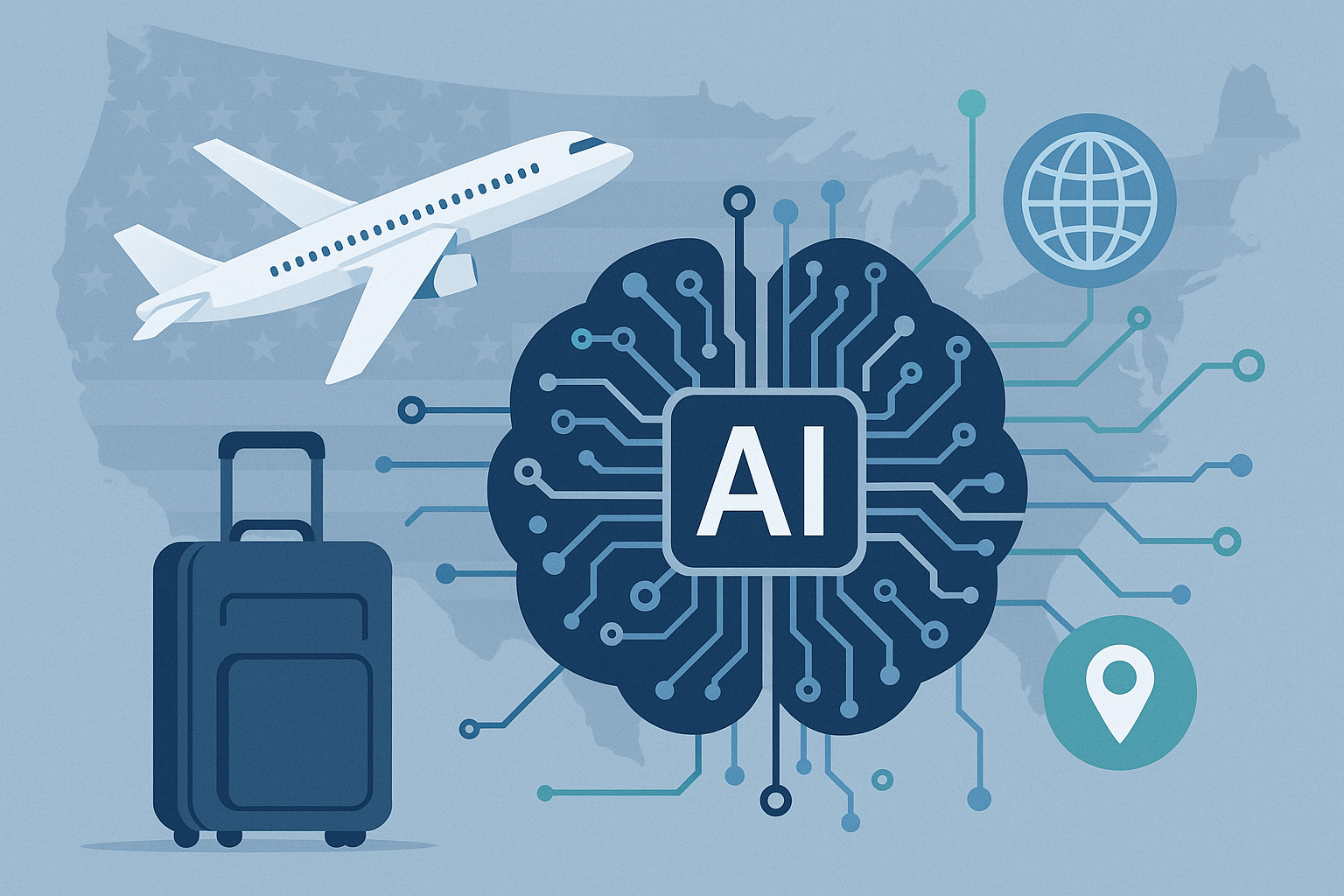
AI in Travel Industry: How Artificial Intelligence is Transforming U.S. Travel in 2025
The travel industry in the United States is undergoing a dramatic transformation, thanks to the rapid adoption of artificial intelligence (AI). From personalized trip planning to automated customer service, AI in travel industry applications are revolutionizing how Americans explore the world. In this comprehensive guide, we’ll dive deep into the latest trends, practical uses, and the top AI solutions shaping the future of travel in 2025.
The Rise of AI in the U.S. Travel Industry
AI is no longer a futuristic concept—it’s a present-day reality for U.S. travelers and businesses. In 2025, AI-powered tools are streamlining operations, enhancing customer experiences, and driving significant revenue growth across airlines, hotels, online travel agencies, and more.
Why AI Matters in Today’s Travel Sector
- 🏥 Enhanced Safety: AI helps monitor health and safety protocols, crucial in a post-pandemic world.
- 📦 Operational Efficiency: Automation reduces costs and improves accuracy in bookings, check-ins, and logistics.
- ✅ Personalization: AI tailors recommendations, making every trip unique and memorable.
TIP: Businesses that leverage AI in travel industry operations are seeing up to 30% higher customer satisfaction rates in 2025.
Top 10 AI Applications in the U.S. Travel Industry (2025)
AI is everywhere in travel, but some applications stand out for their impact and innovation. Here are the top 10 ways AI is transforming travel in the United States this year:
- AI-Powered Chatbots for Customer Service
- Personalized Travel Recommendations
- Dynamic Pricing and Revenue Management
- Facial Recognition for Seamless Check-Ins
- Smart Baggage Handling Systems
- Predictive Analytics for Flight Delays
- Voice Assistants for Travel Planning
- AI-Driven Fraud Detection
- Automated Translation Services
- Robotic Process Automation in Operations
Side-by-Side Comparison Table: Top 10 AI Travel Applications
| Rank | AI Application | Main Benefit | Example Use Case |
|---|---|---|---|
| 1 | AI Chatbots | 24/7 Customer Support | Airline FAQs, hotel bookings |
| 2 | Personalized Recommendations | Tailored Experiences | Custom itineraries |
| 3 | Dynamic Pricing | Maximized Revenue | Real-time airfare adjustments |
| 4 | Facial Recognition | Faster Check-Ins | Airport security, hotel entry |
| 5 | Smart Baggage Handling | Reduced Lost Luggage | Automated sorting/tracking |
| 6 | Predictive Analytics | Fewer Delays | Flight status notifications |
| 7 | Voice Assistants | Hands-Free Planning | Booking via smart speakers |
| 8 | Fraud Detection | Safer Transactions | Payment verification |
| 9 | Automated Translation | Better Communication | Multilingual customer support |
| 10 | Robotic Process Automation | Streamlined Operations | Invoice processing, reporting |
How AI in Travel Industry Improves Customer Experience
Personalized Trip Planning
AI algorithms analyze user preferences, past trips, and real-time data to suggest destinations, hotels, and activities that match individual tastes. This level of personalization was unimaginable just a few years ago.
24/7 AI Chatbots and Virtual Assistants
Travelers expect instant answers. AI-powered chatbots provide round-the-clock support, handling everything from booking changes to local recommendations—no human agent required.
Seamless Check-Ins and Security
Facial recognition and biometric systems powered by AI speed up airport and hotel check-ins, reducing wait times and enhancing security.
TIP: In 2025, over 60% of major U.S. airports use AI-driven facial recognition for faster passenger processing.
AI-Driven Operational Efficiency in U.S. Travel
Dynamic Pricing and Revenue Management
AI analyzes market trends, competitor pricing, and demand patterns to optimize prices in real time. Airlines and hotels maximize revenue while offering competitive rates to travelers.
Smart Baggage Handling
AI-powered systems track and route luggage with incredible accuracy, minimizing lost or delayed bags—a major pain point for U.S. travelers.
Predictive Analytics for Disruption Management
AI forecasts weather, mechanical issues, and other factors that can cause delays, allowing airlines and passengers to adjust plans proactively.
The Future of AI in Travel Industry: Trends to Watch in 2025
Voice Search and Conversational AI
More Americans are using voice assistants to research and book travel. AI-powered platforms understand natural language, making the process faster and more intuitive.
Sustainability and Eco-Friendly Travel
AI helps travelers and companies make greener choices by optimizing routes, reducing energy usage, and recommending sustainable options.
Hyper-Personalization
AI will continue to refine its ability to deliver hyper-personalized experiences, from curated travel packages to real-time itinerary adjustments based on preferences and circumstances.
Challenges and Considerations for AI in Travel Industry
While AI brings many benefits, it also presents challenges:
- Data Privacy: Ensuring traveler data is secure and used ethically.
- Bias and Fairness: Preventing AI from reinforcing biases in pricing or recommendations.
- Integration: Seamlessly connecting AI systems with legacy travel infrastructure.
TIP: U.S. travel companies investing in robust AI governance and transparency are building greater trust with customers in 2025.
Conclusion: AI in Travel Industry is Redefining the U.S. Travel Experience in 2025
AI in travel industry applications are fundamentally reshaping how Americans plan, book, and enjoy their journeys. From AI-powered chatbots and personalized recommendations to dynamic pricing and smart baggage handling, artificial intelligence is delivering unprecedented convenience, efficiency, and satisfaction for travelers and businesses alike.
As we move further into 2025, the integration of AI will only deepen, driving innovation and setting new standards for the U.S. travel sector. Companies that embrace AI responsibly—prioritizing data security, fairness, and seamless user experiences—will lead the way in this exciting new era of travel.
Whether you’re a traveler seeking a smoother journey or a business aiming to stay ahead, understanding and leveraging AI in the travel industry is essential for success in today’s fast-evolving landscape.